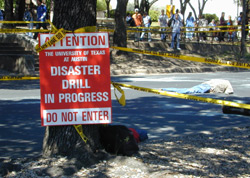 I liked the "disaster" quote. And as students of history know, all manias end with a reverting past the mean - falling to levels seen before the bubble started. And yes, that'll be a disaster.
I liked the "disaster" quote. And as students of history know, all manias end with a reverting past the mean - falling to levels seen before the bubble started. And yes, that'll be a disaster.
Here's some PBS bubble transcript highlights. You can also listen to the audio by clicking on the headline
Slow Housing Market Affects Economic Growth
PAUL SOLMAN, NewsHour Economics Correspondent: The economy's good: unemployment, low; stock market, up. The economy's bad: consumer confidence, shaky; auto industry, stalled; and most importantly, perhaps, housing is on the skids.
Home sales are down some 14 percent from last year. New housing starts, down almost 30 percent, knocking more than a full percentage point off economic growth. And there's great fear these days that the hottest housing markets of recent years, like California and New York, will fall hardest.
ED YARDENI, Chief Investment Strategist, Oak Associates: The total value of the housing stock in the United States is actually close to $25 trillion today. And just five years ago, it was only about $14 trillion.
NOURIEL ROUBINI: Prices have already fallen almost 10 percent for new homes.
KARL CASE: Well, if it goes down by as much as it's gone up, that is a disaster.
November 20, 2006
PBS housing implosion report: "If it goes down by as much as it's gone up, that's a disaster"
Posted by
blogger
at
11/20/2006
![]()
![]()
Subscribe to:
Post Comments (Atom)



2 comments:
And your point? Throw the world into that bag. How much have values gone up in China, Australia, NZ, Britain, Europe, S Africa, the middle east, Canada?
How much has the dollar devalued against other currencies? How much REAL inflation? Kind of like gasoline. Sixteen cents in 1920 and $2 in 2002? It was cheaper in 2002. People never put numbers in context.
The throttle is wide open:
http://tinyurl.com/m7bs7
Mortgage interest rates are coming down because the Bank of Japan is doing the same thing. Don't fight the Fed.
Post a Comment